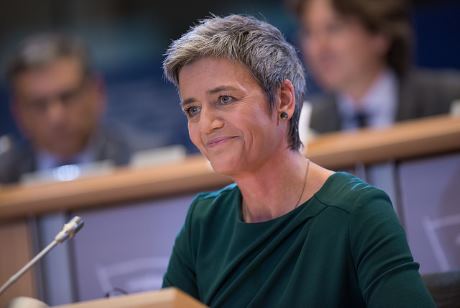Climate action and a low-carbon economy have been recurring themes as members of the European parliament have grilled candidates for top posts in the next European Commission over the past week, but nuclear energy has been largely missing from the debate.
 |
| Commissioner-designate for competition Margrehte Vestager answers questions (Image: European Parliament) |
The European Commission is one of the main institutions of the European Union, responsible for drafting proposals for new European laws as well as managing the implementation of EU policies and expenditure of EU funds. The 28-strong Commission is headed by a president elected by the European Parliament. The commissioners - one from each EU country - are each assigned responsibility for a specific policy area. All serve a five-year term, and together provide the political leadership of the Commission. Commissioners are chosen by the president, but their appointment must be approved by the European Parliament.
The current list of commissioners-designate has been drawn up by President-Elect Jean-Claude Juncker, the former president of Luxembourg who was elected to be the next president of the European Commission in July. Juncker will succeed current president Jose Manuel Barroso in November. Over recent days, each of Juncker's proposed commissioners has taken part in a three-hour hearing in which they have made a short presentation about their qualifications and suitability for their proposed post and faced questions from members of the European Parliament.
Questioned about her stance on the impending ruling by the European Commission on state support for the UK's Hinkley Point C nuclear new-build project, commissioner-designate for competition Margrehte Vestager said that decisions on energy generation were a matter for the individual state. The Commission's role was solely to make sure that state aid rules were being followed. "It is for member states themselves to decide what kind of mix do they wish to have when it comes to energy supply and production. It's not an issue for us here," she said. Vestager also pointed out that in any case, it was likely that a decision would already have been made under current Competition Commissioner Joaquin Almunia before the new commissioners take up their posts.
Former Slovenian prime minister Alenka Bratušek, nominated for the senior role of Vice-President for Energy Union, would be tasked with steering and coordinating the work of several commissioners including the commissioner for climate action and energy and the commissioner for research, science and innovation. Bratušek outlined a five-year agenda to create an energy union based on three pillars of a strong internal EU energy market, the continued promotion of renewable energy, and boosting sustainable development and "green growth" through dedication to achieving and setting ambitious climate targets. In the ensuing question and answer sessions, Bratušek also stated that member states are individually responsible for their energy mix but referred many times to growth in renewables as crucial for her vision.
In his hearing, commissioner-designate for climate and energy Miguel Cañete said that the decision to join climate and energy action under one commissioner would strengthen the instruments of action available to the EU, and also emphasized the role that he felt renewables would play in the fight against climate change. However, the former Spanish agriculture minister was questioned at some length about potential conflicts of interest arising from his family's business affairs.
In theory, the European Parliament can only accept or reject the entire proposed commission, although in practice the relevant committees can withhold their confidence from nominees they feel display a poor understanding of their portfolio or if they have other concerns about a candidate's suitability for the role.
Researched and written
by World Nuclear News






_15863.jpg)







